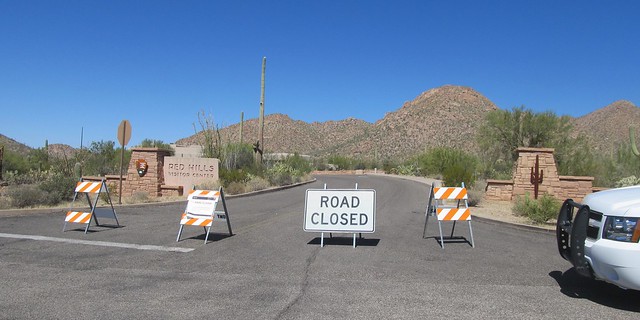More than a week has now passed since the national parks were closed, victims of a bitter and protracted political stalemate in Congress. Although nearly all sectors of American society have been hit by the government shutdown, the closure of the national parks stands out in news reports and other accounts of the impact the shutdown is having. What is it about the national park closure that merits such scrutiny and coverage?

Saguaro National Park Closed (cc) Raquel Baranow @ Flickr.com
The parks plainly touch a core dimension of the American psyche. National parks are the places where Americans come face to face with our collective heritage. We can reconnect with our frontier origins at Yellowstone, gaze across the landscape and the same wildlife Lewis and Clark encountered on their epic Voyage of Discovery. They are where Americans can learn about the vexing challenges the Framers faced when drafting the Constitution in Independence Hall during the summer of 1787, and the gallantry displayed on both sides when Union and Confederate troops clashed at Gettysburg during the fateful summer of 1863, and our multi-faceted cultural heritage at sites like the Frederick Douglass National Historic Site. As a place and as an idea, the parks have become an elemental and cherished part of the American experience.
As I recount in
To Conserve Unimpaired: The Evolution of the National Park Idea, the parks are much more than this, however. They are also vital nature reserves, where we safeguard wild animals and allow Mother Nature to unfold before our eyes. They are prime tourist destinations, outdoor laboratories, natural playgrounds, and extraordinary educational settings. They are places where cherished family memories are born, where individual epiphanies are realized, and where our youth are introduced to healthy outdoor activities. And they are often home to sacred sites for Native Americans.
Moreover, the parks serve as vital economic engines for the gateway communities and concessionaires who provide lodging and other services for park visitors, and who now face a severe loss of seasonal revenue. By some accounts, the absence of park visitors costs local communities near parks as much as $30 million a day, money that benefits local businesses, which are now planning to lay-off workers, another hit to the nation’s staggering economic recovery. No wonder nine southern Utah counties have asked the Governor to declare a state of emergency in the face of a precipitous drop in tourist revenues following the park closures.
Despite problems like overcrowding, pollution events, and deteriorating facilities, park visitors regularly rate their park visits as superlative experiences. They give the rangers and other park employees who they encounter high marks for their knowledge, assistance, and commitment. These are the same Park Service employees, who are themselves victims of the government shutdown, missing paychecks and even incurring the wrath of uninformed visitors who mistakenly blame them for the park closures.
Ironically, the closure has virtually nothing to do with the parks, which have long enjoyed broad bi-partisan support. From the beginning, both Democrats and Republicans have supported the national park system, including new park designations and funding requests. Individual congressional representatives, regardless of their political persuasion, regularly appear before the appropriation committees on behalf of the parks located in their districts, well aware of the local economic revenues and other tangible and intangible benefits that accrue from these special places. It was no surprise then that the House of Representatives passed a bill singling out the national parks for reopening.
It is nonetheless apparent that the national parks are not immune from politics. One might hope, going forward, that the strong showing of public support for the national parks that has emerged during the shutdown might convince Congress to fund and support our much beloved park system at the level where the American public plainly values it. That would be an appropriate gift to the nation’s citizens in the aftermath of the current closure debacle, one that would also be particularly timely as we approach the 2016 centennial of our remarkable national park system.



